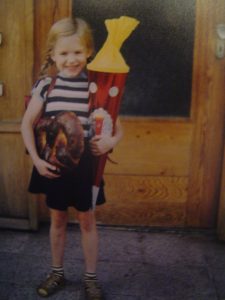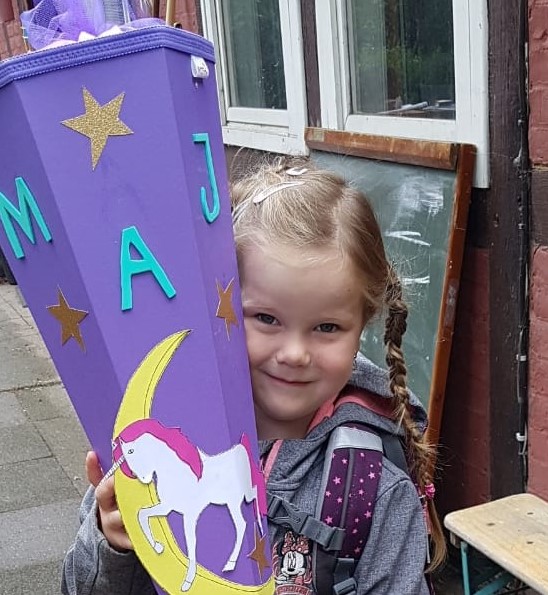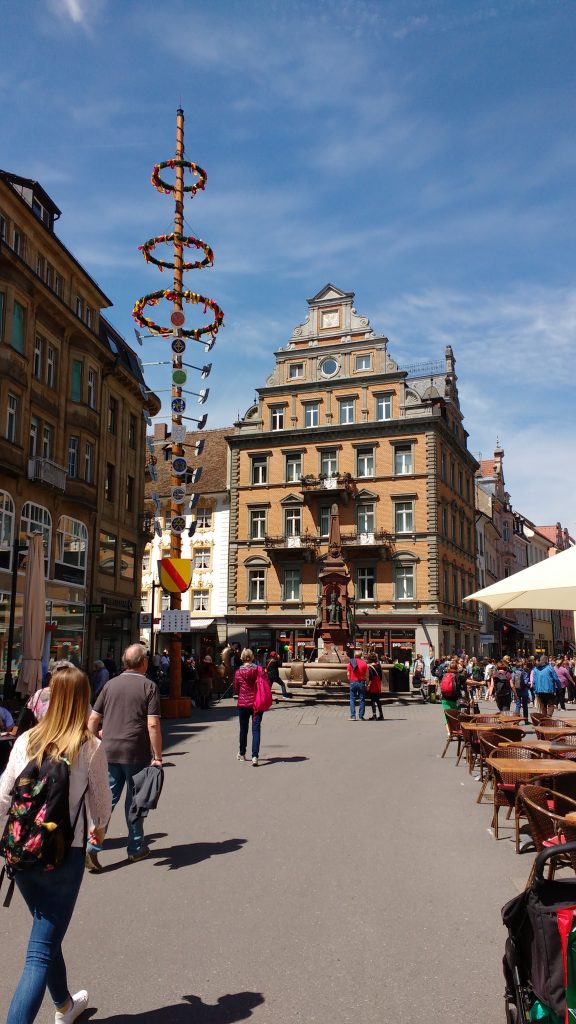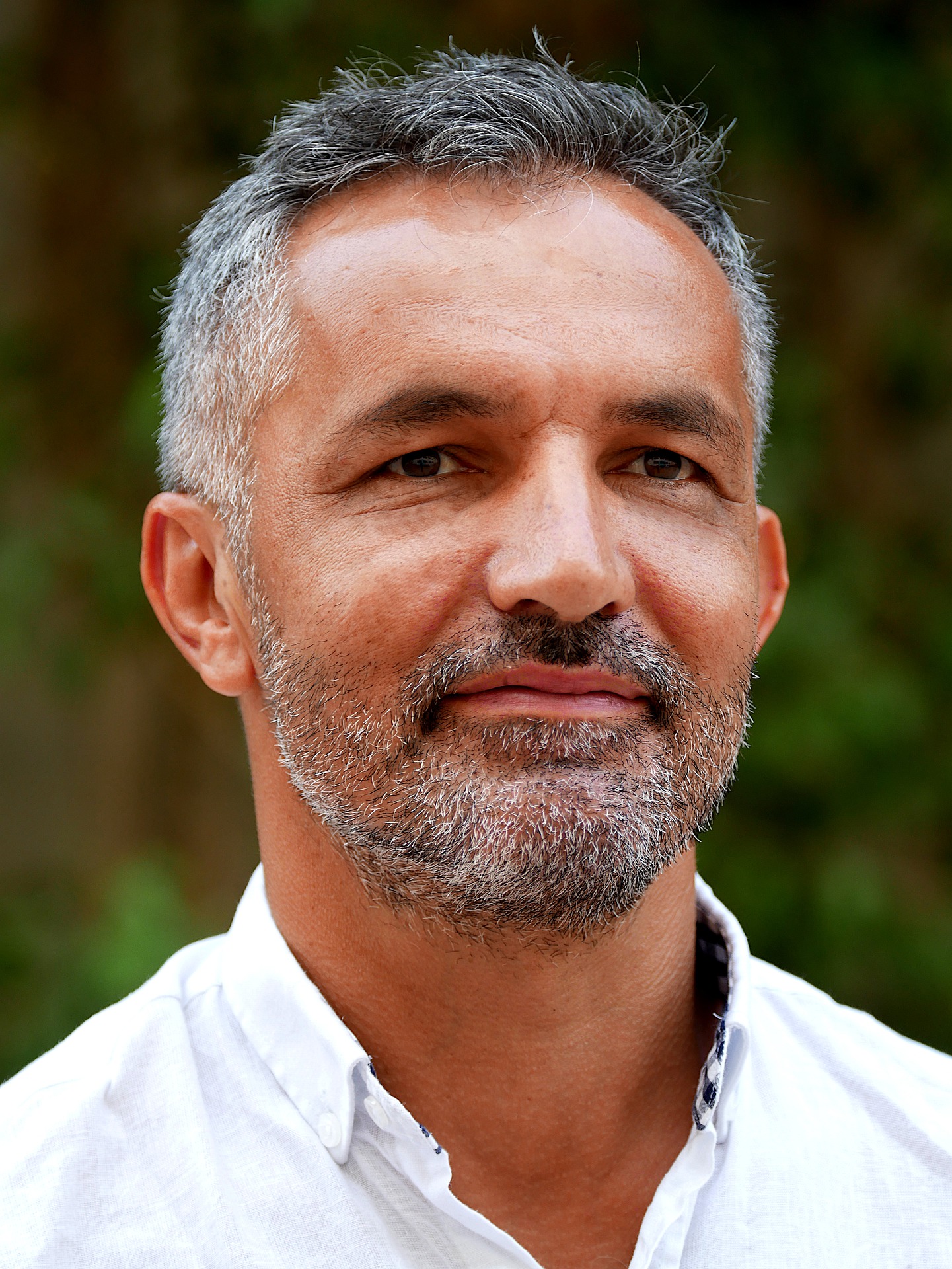5.6: 5.4-
- Page ID
- 82732
Einheit 5.4 (online)
Der erste Schultag
|
For German children, the first day of (elementary) school is a big event! As there is no pre-school in Germany, starting grade 1 in elementary school is a clear break from the playful kindergarten or daycare that most kids attend before. It signifies the start of their 9-13 years of education that follow and as such, it is celebrated in style. The most important item that children receive on their first day of school is the “Schultüte” or school cone, made out of paper and filled with sweets, toys, small gifts, and school supplies. In some regions of Germany, the “Schultüte” is therefore also sometimes called a “Zuckertüte”. “Schultüten” are meant to “sweeten” the children’s entry into the more serious world of school and education. The tradition of the “Schultüte” goes back to the late 19th century, but it is still very much alive today. Children receive their “Schultüten” from their godparents or parents and take them to school on the first day. After school is over, they unpack their “Schultüten” at home and enjoy their presents. The first day of school is sometimes also celebrated by having cake in the afternoon with relatives and neighbors. |

Claudias erster Schultag! |
![]() Übung 1: Majas erster Schultag! Choose the correct auxiliary verb.
Übung 1: Majas erster Schultag! Choose the correct auxiliary verb.
 |
The original version of this chapter contained H5P content. You may want to remove or replace this element. |
![]() Die Geburtstagsparty. Hören Sie zu und beantworten Sie die Fragen.
Die Geburtstagsparty. Hören Sie zu und beantworten Sie die Fragen.
An audio element has been excluded from this version of the text. You can listen to it online here: http://pb.libretexts.org/germans1/?p=389
 |
Jessica und Jakob treffen sich auf dem Marktplatz.
The original version of this chapter contained H5P content. You may want to remove or replace this element.
|
![]() Grammatik
Grammatik
Simple Past Tense: “haben” and “sein”
Usually, when talking about events that happened in the past, we use the perfect tense. However, the verbs haben and sein are more commonly used in the simple past tense instead of the perfect tense.
You have seen examples of the simple past tense in Thomas’ and Mario and Silvia’s description of their weekends:
Thomas hatte ein total langweiliges Wochenende!
Sein Fahrrad hatte einen platten Reifen.
Silvia und ihre Freunde waren nach dem Frisbeespiel ein bisschen müde.
Das Essen im afghanischen Restaurant war sehr gut.
| sein | to be | haben | to have |
| ich war | I was | ich hatte | I had |
| du warst | you were | du hattest | you had |
| er/sie/es war | he/she/it was | er/sie/es hatte | he/she/it had |
| wir waren | we were | wir hatten | we had |
| ihr wart | you (plural) were | ihr hattet | you (plural) had |
| sie/Sie waren | they/you (formal) were | sie/Sie hatten | they/you (formal) had |
![]() Übung 2: Anna war krank.
Übung 2: Anna war krank.
The original version of this chapter contained H5P content. You may want to remove or replace this element.
![]() Grammatik
Grammatik
Perfect Tense (2)
Please work through the following presentation to learn more about the perfect tense.
*Achtung* Here is a list of common irregular verbs: Irregular Verbs Einheit 1-5
![]() Übung 3: Ein schrecklicher Tag für Herrn Romano
Übung 3: Ein schrecklicher Tag für Herrn Romano
| The original version of this chapter contained H5P content. You may want to remove or replace this element. |  |
![]() Was wissen Sie jetzt? Klicken Sie hier für Quiz 5.4.
Was wissen Sie jetzt? Klicken Sie hier für Quiz 5.4.
Media Attributions
- der erste Schultag © ckost is licensed under a All Rights Reserved license
- star © IO-Images is licensed under a Public Domain license
- Maja © ckost is licensed under a All Rights Reserved license
- headphones © IO-Images is licensed under a Public Domain license
- Marktplatz © ckost is licensed under a CC BY-NC-SA (Attribution NonCommercial ShareAlike) license
- light-bulb © IO-Images is licensed under a Public Domain license
- man-4623801_1920 © Marc Thele is licensed under a Public Domain license
- link © IO-Images is licensed under a Public Domain license
- check mark © janjf93 adapted by Solomon Hajramezan is licensed under a Public Domain license


